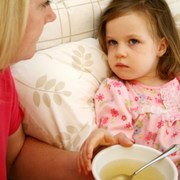 Photo: Getty Images
Photo: Getty Images
As cold and flu season approaches, parents can be tempted to give their children over-the-counter cold medicine to relieve a stuffy head or a persistent cough. It seems, however, that there is no proof that OTC cold products are effective in children under two or even older kids.
In fact the Center for Disease Control (CDC) now recommends that children under the age of 4 should not be given OTC cold or cough meds, unless a doctor recommends this.
The concern with nonprescription cough and cold medicines and kids lies in the possible life-threatening side effects including rapid heart beat and convulsions. According to the Federal Drug Administration (FDA) these dangerous side effects can occur if too much of a dose for the child’s age is given, if the medicine is give too often, or if two different OTC cold products with the same active ingredient are administered.
The CDC reports that thousands of children under age 12 wind up in the emergency room due to OTC cough or cold medicine. In fact, many of these children ingested the medicine while unsupervised.
If you decide to treat your child with OTC cough or cold medicine, FDA recommends that you carefully read and follow the dosing directions on the package. If you are confused about the dosing directions or how the measuring device works, don’t give your child a dose until you talk to a pharmacist or health care provider. Also, check the active ingredients and warnings listed on the packaging.
The Mayo Clinic has some alternatives to OTC medicines for treating a stuffy head or a persistent cough. Fluids can help thin mucous and loosen congestion. The age-old remedy of chicken soup may even have anti-inflammatory properties. A suction bulb, cool-mist humidifier, or saline nasal drops may also help with nasal passages. A sore throat can benefit from popsicles and warm or cold drinks.
Older children can gargle with warm salt water mixture to temporarily help a scratchy or sore throat. Rest and relaxation does wonders to help a child’s body recover from a cold, too. Of course, if it appears that your child’s cold is not simply running its course, with or without OTC medicine, talk to your doctor.
Sources:
The Mayo Clinic. Cold Medicines for Kids. Web. 26, Oct. 2011.
http://www.mayoclinic.com/health/cold-medicines/CC00083/NSECTIONGROUP=2
Federal Drug Administration. Public Health Advisory: Nonprescription Cough and Cold Medicine. Web. 26, Oct. 2011.
http://www.fda.gov/Drugs/DrugSafety/PostmarketDrugSafetyInformationforPatientsandProviders/DrugSafetyInformationforHeathcareProfessionals/PublicHealthAdvisories/ucm051282.htm
Center for Disease Control. Cough and Cold Meds. Web. 26, Oct. 2011.
http://www.cdc.gov/features/pediatriccoldmeds
Reviewed October 27, 2011
by Michele Blacksberg RN
Edited by Jody Smith






Add a CommentComments
There are no comments yet. Be the first one and get the conversation started!